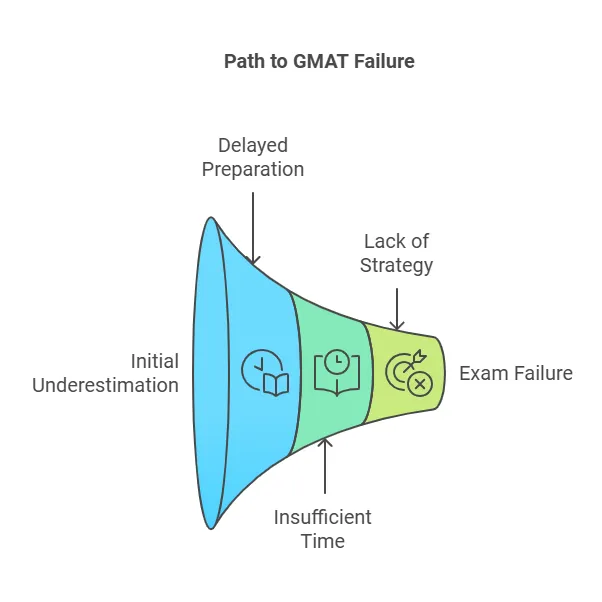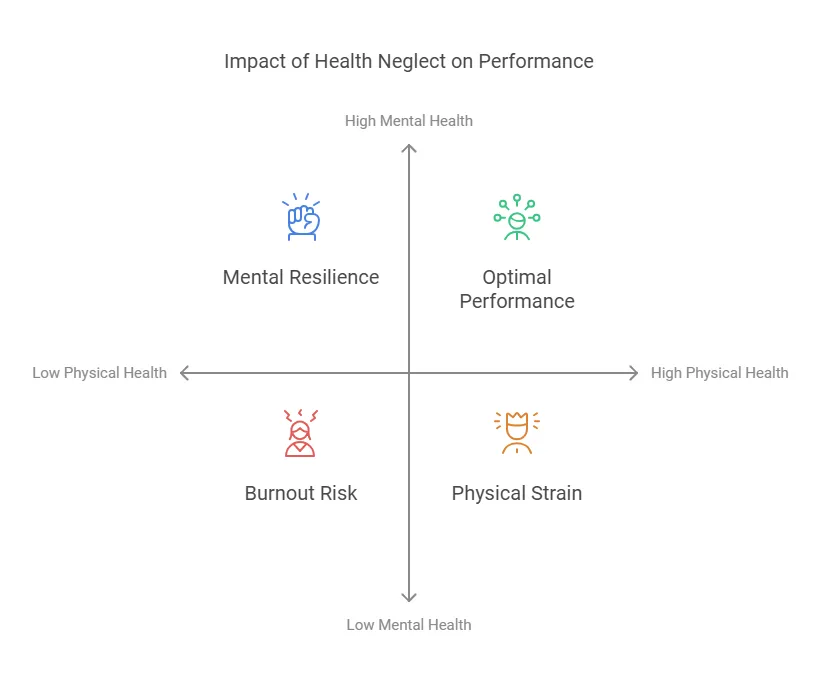Why Students Fail in Exams Like GMAT| Top Reasons
The GMAT is a critical exam for any student looking to attend the best business schools in the world. Its robust format assesses analytical, verbal, and quantitative skills. However, despite abundant preparation material and resources, many students do not reach their target scores. Knowing the most common mistakes can assist future test-takers to fine-tune their strategy and better their chances of success. Below, we explore the top reasons why students fail in exams like GMAT, along with insights and practical recommendations for a better prep for the exam.
1.Inconsistent Preparation
Most of the students fail in exams like GMAT due to the reason that they have done preparation haphazardly. Students underestimate the test complexity, delay their preparation, and ultimately get left with little time to prepare a solid base or to learn strategies.
👉Procrastination or Delay in Study
Procrastination usually results in last-minute and ineffective preparations. For example, if a student starts late, the cramming will not help in long-term retention and concept mastery. Short daily study sessions can really work wonders for performance.
👉Lack of Effective Study Plan
A proper plan is necessary to cover all sections-Quantitative, Verbal, Integrated Reasoning, and Analytical Writing. However, most students do not have a proper study schedule, thus making preparation uneven. If some areas are ignored like Data Sufficiency or Sentence Correction, there will be some vulnerabilities on the test day.

🎯Solution
Develop a personalized schedule that distributes time according to strengths and weaknesses. Regular assessments can also help to adjust focus areas dynamically.
2.Misunderstanding the Test Format
The unique structure of the GMAT sometimes leaves students caught off guard. The computer-adaptive format and special types of questions require more than just general test-taking abilities.
👉Lack of Familiarity with Question Types
Questions such as Critical Reasoning in the Verbal section or Data Sufficiency in Quantitative are very different from the usual formats. They require analytical thinking and logical structuring rather than solving problems directly.
👉Failure to Recognize the Adaptive Format
The computer-adaptive nature of the GMAT adjusts question difficulty based on performance. This dynamic can intimidate students unfamiliar with it, leading to poor time management and unnecessary stress.
🎯Solution
Take GMAT-specific practice tests to familiarize yourself with these formats. Focus on understanding the logic behind question construction rather than solely seeking correct answers.
3. Weak Fundamentals
Poor foundational knowledge in math and English mostly hampers performance. Such is usually seen with a student relying on shortcuts who does not understand what goes on at the foundational levels.
👉Lack of Arithmetic, Algebra, and Geometry Skills
The Quantitative portion tests the student on the basic arithmetic, algebra, and geometry skills most people ignore. Poor calculating skill or a failure to put formulas in use means steady mistakes.
Master grammatical issues, vocabulary, and basic understanding. Misconceptions involving sentence correction and reading comprehension cause a substantial decrease in score.
🎯Solution
Thoroughly understand basic math and English work completed in high school. Material available in grammar guides or workbooks created for students who are GMAT studying may fill the knowledge deficits.
4.Poor practice
Practicing doesn’t work unless they practice. Students too easily fall into patterns that repeat or otherwise lack focused attention.
👉Relying Solely on Memorization
The GMAT emphasizes reasoning over rote learning. Memorizing formulas or grammatical rules without understanding their applications results in poor performance on adaptive questions.
👉Low-Quality Practice Material
Not all GMAT prep materials reflect the actual test’s difficulty or question style. Students using outdated or overly simplified resources often find the real exam far more challenging.
🎯Solution
Focus on high-quality resources like the GMAT Official Guide. Include strategic reviews to examine why certain answers are right or wrong.
5. Test-Taking Anxiety
Performance anxiety is a huge obstacle for many test-takers. Stress during preparation or on test day can hinder focus and decision-making.
👉Pressure to Perform
High expectations from peers, family, or oneself create undue stress. This pressure often results in second-guessing and rushing through sections.
👉Time Management Stress
Strict time limitations on the GMAT also compound anxiety, especially if they haven’t practiced how to pace. Many students are left with unanswered questions and resort to random guesses.
🎯Solution
Relaxation techniques such as deep breathing or mindfulness exercises may help. Practice under conditions close to the actual test conditions to become accustomed and more comfortable.
6.Not sitting for Mocks and not reviewing
Mock tests are vital to success in GMAT. However, most students either ignore them or do not study their performance.
👉Lack of Full-Length Mock Tests
Students who avoid mocks generally do not assess their stamina or pacing. This could bring about exhaustion or even inefficient time management during the examination.
👉Lack of Thorough Error Analysis
Missed mistakes are repeated mistakes. Knowing why an answer is wrong and what type of mistakes are made helps strategize better.
🎯Solution
Take at least 5–7 full-length mock tests before the exam. Use error logs to track and analyze mistakes systematically.
7.Ignoring Strategic Approaches
The GMAT rewards strategic thinking as much as subject knowledge. Ignoring strategies like educated guessing or effective skipping can lead to avoidable score losses.
👉Over-Spending Time on Hard Questions
Most students spend precious time on difficult questions that might have been easier. Since the test adapts to their scores, this translates to reduced scores.
👉Rote Guessing
Chances are, when forced to guess without a plan, especially with the pressure of time, one tends to drop scores un-necessarily. The possibility of guessing a correct answer can increase by making strategic use of eliminating possibilities.
🎯Solutions
Learn to know when to leave the question. Improve chances through techniques like elimination or patterns.
8.Health and Well-Being Neglect
Neglecting physical and mental health impacts performance, especially in multiple responsibilities.
👉Burnout
Long hours of study without breaks lead to exhaustion and affect retention and focus.
👉Neglecting Physical Health
Sleep deprivation, poor diet, and lack of exercise reduce cognitive abilities required for GMAT success.

🎯Solution
Take regular breaks, maintain a balanced diet, and exercise to remain physically and mentally fit.
9.External Distractions
Balancing GMAT prep with other commitments, including work or family, becomes difficult, especially for working professionals.
👉Balancing Studies with Work
The need to balance full-time jobs with preparation often results in unbalanced study schedules and exhaustion.
👉Lack of Support System
Without support and motivation from mentors, peers, or professional coaches, staying disciplined becomes tough.
🎯Solution
Set clear boundaries between work and study time. Engage in study groups or hire a tutor for structured support.
10.Overconfidence or Pessimism
Mostly, it is a poor self-appraisal that derails preparation.
👉Overconfidence
The student overestimates himself during the preparation time for the GMAT and forgets about the weaker aspects. This misplaced belief on the readiness leads them to spend less time on difficult topics, assuming they are going to do well without sufficient effort. Their unpreparedness turns out to be evident in the lower score obtained at the end. Since they overrate their strengths and avoid aspects of improvement, these students are unable to achieve their target scores in the actual test. One needs to identify early the areas of weakness, work on them while preparing all sections of the test, and maintain humility and focus till the end of the preparation stage.
👉Pessimistic Attitude
On the other hand, self-doubt brings less motivation to prepare or appear for a test.
🎯Solution
Remain realistic with constant self-appraisals. Reward tiny accomplishments for motivation to remain intact.
Conclusion
A high GMAT score is achieved not by studying but by strategic preparation, consistent practice, and mental resilience. It is by addressing these common pitfalls that students can enhance their performance and approach the test with confidence.




